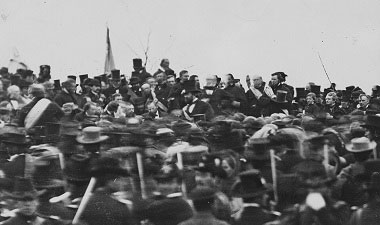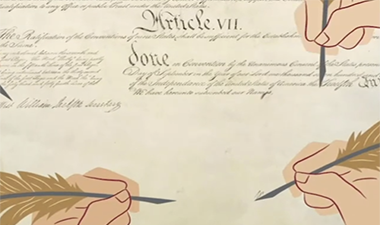Summary
James McHenry mostly attended the later part of the Constitutional Convention, and then campaigned vigorously for it at the Maryland state Convention.
James McHenry | Signer of the Constitution
2:37
Biography
James McHenry was born in Ireland in 1753, but emigrated to Philadelphia at the age of 18. The rest of his family arrived in America the following year, including his father and brother who founded an import business in Baltimore. McHenry had received a classical education in Dublin, but continued his schooling at an academy in Delaware. After graduating from the academy, McHenry studied medicine in Philadelphia with the noted physician Benjamin Rush.
A strong supporter of independence, McHenry served as a military surgeon once the war began. He was captured by the British at Fort Washington, N.Y., in 1776 and exchanged for an enemy prisoner in March 1778. He returned at once to active duty and was deployed to Valley Forge. There, he became General Washington’s secretary. He remained with Washington until 1780, then joined LaFayette’s staff.
Although he had prepared for a career in medicine, after returning to civilian life McHenry decided to give up medicine in favor of politics. He began his chosen second career by serving in the Maryland Senate for 5 years. During his years in the Senate, he also served as a representative to the Confederation Congress between 1783 and 1786.
In 1787, McHenry was sent to the Constitutional Convention, but his attendance was spotty due to a serious illness suffered by his brother. Even when he was present, he rarely participated in the debates. He did, however, keep a journal that provides the fullest account of Edmund Randolph’s opening speech in which Randolph detailed the failings of the Articles of Confederation and proposed the Virginia Plan.
McHenry’s record on the Convention was interrupted by his departure to care for his brother, but it resumed on August 4th after his return to Philadelphia. His August entries offer insight into the private views of the members of the Maryland delegation. In one of their caucuses, McHenry’s colleague John Mercer asked each of the men whether they thought Maryland would support a new Constitution. It became clear that Luther Martin thought the new government would be rejected. McHenry noted that Martin admitted he “was against the system” and that he regretted Mr. Jenifer did not stand with him. As the Convention drew to a close, McHenry recorded Luther Martin dramatically declaring, “I’ll be hanged if ever the people of Maryland agree to it.” To which, Daniel of St. Thomas Jenifer replied to Martin, “I advise you to stay in Philadelphia lest you should be hanged.” In the end, neither Martin nor Mercer would sign the Constitution.
For his part, McHenry would campaign vigorously for the ratification of the Constitution at the state Convention. He served in the Maryland legislature but welcomed President Washington’s offer of the post of Secretary of War when it was made. He continued to hold this position during John Adams’s administration. Unfortunately, McHenry angered Adams by looking to Adams’s harshest critic, Alexander Hamilton, for policy leadership. As a result, the President forced McHenry to resign in 1800. Adams maintained his grudge against McHenry for years and denounced him in an 1809 recollection of his administration.
During the Adams administration, McHenry played a critical role in the military preparation for a possible war with France. McHenry supported the creation of a 20,000-man army to meet the immediate threat. However, Republicans claimed that this supposedly provisional force was really intended as a permanent standing army, something Americans were wary of. Although McHenry strongly advocated civilian control over military affairs, when the Republicans took the Presidency they accused him of maladministration. A congressional committee absolved him of wrongdoing, but the political attack persuaded him to retire from public service.
Even removed from public office, McHenry maintained a strong allegiance to the Federalist party and opposed “Mr Madison’s War “ in 1812. In 1814, McHenry suffered a paralysis that left him unable to use his legs. In 1816, at the age of 62, he died from a fever.








